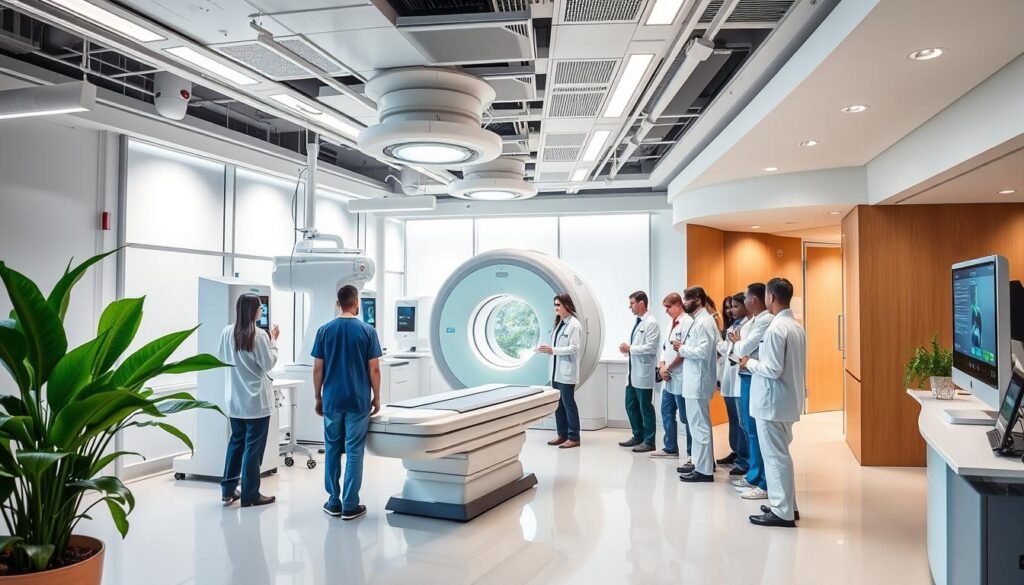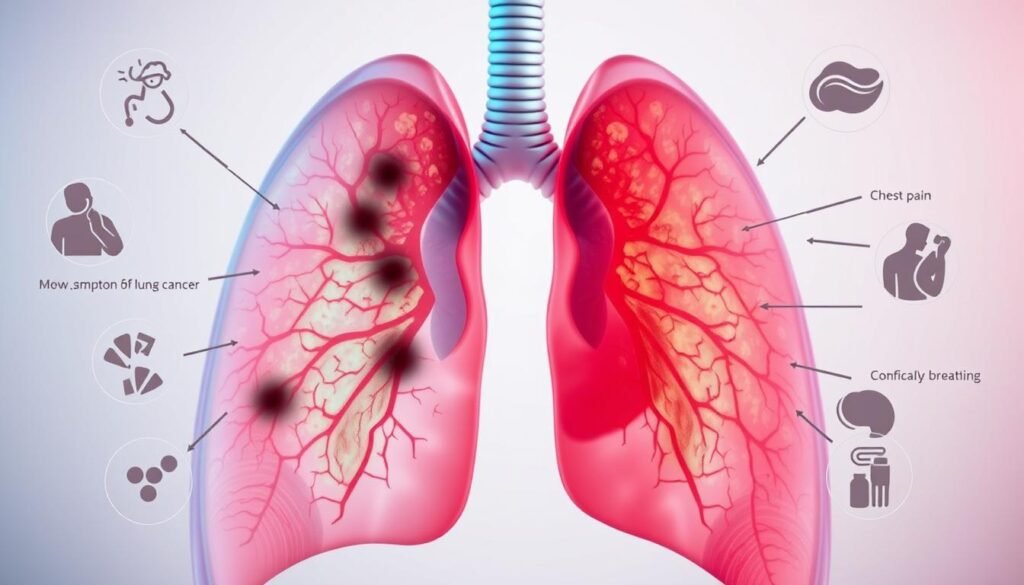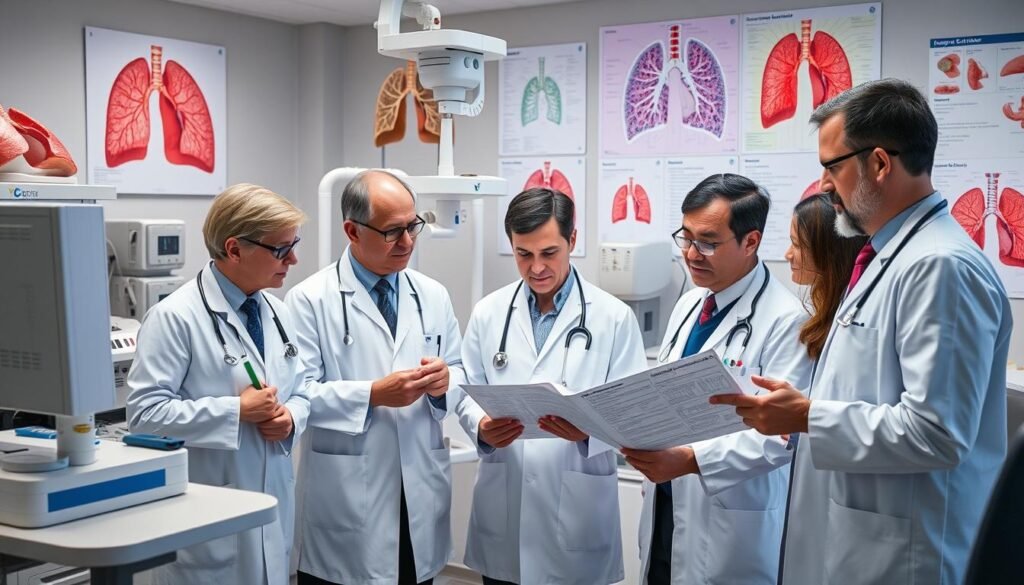Lung cancer is the top cause of cancer deaths in the USA. This means it causes more deaths than breast, prostate, and colorectal cancers put together. In Washington, DC, fighting this huge health issue demands expert care and a whole approach. The area boasts top medical centers specializing in lung cancer treatment. Johns Hopkins Kimmel Cancer Center and MedStar Health are noted for their personalized care. They use new methods like immunotherapy and proton therapy. Plus, they offer strong support services for patients during their treatment.
In Washington DC, lung cancer doctors are really dedicated. They include trained pulmonologists, oncologists, and care professionals. They’re committed to treating all stages of lung cancer with the latest medical tech. This helps improve outcomes for patients. It’s crucial to know how chemo drugs like Cisplatin and Docetaxel work against lung cancer. They are key in making treatment plans that work. Knowing about these drugs helps patients have hope while fighting lung cancer. More info on how chemo fights lung cancer can be found here.
Key Takeaways
- Lung cancer is the most deadly cancer in the U.S., beating other cancers combined.
- Washington DC is home to leading lung cancer hospitals offering cutting-edge treatments.
- New techniques like robotic surgeries are improving lung cancer care.
- Treatments are tailored to improve patient outcomes and provide support.
- Understanding how treatments work leads to better care strategies.
Understanding Lung Cancer
Lung cancer is a major health issue that deeply affects both individuals and their communities. It’s crucial to know the different kinds and how they work. This knowledge is key for managing and treating the disease well.
There are mainly two types of lung cancer. Each has unique features. These differences help doctors decide the best way to treat it and predict how it might turn out.
What is Lung Cancer?
Lung cancer starts in the lungs and might spread to other parts. Doctors look at the cancer cells to figure out the type. Non-small cell lung cancer (NSCLC) makes up about 80% of cases and grows slowly. On the other hand, small cell lung cancer (SCLC) grows quickly and is closely linked to smoking.
Types of Lung Cancer
Knowing the types of lung cancer helps people understand their treatment options. Here is a breakdown of the two main types:
| Type of Lung Cancer | Characteristics | Prognosis |
|---|---|---|
| Non-small cell lung cancer (NSCLC) | Slower-growing, more common type | Generally has a better prognosis than SCLC |
| Small cell lung cancer (SCLC) | Fast-growing, often associated with smoking | More aggressive with lower survival rates |
Being aware of lung cancer symptoms is essential. Look out for signs like a lasting cough, chest pain, and losing weight without trying. Spotting these early helps get a quick diagnosis and better treatment results.
Lung Cancer Washington DC: A Regional Overview
Washington, DC, is vital for treating lung cancer. It offers patients top-notch medical institutions. These facilities are home to some of the best lung cancer doctors who focus on this tough disease. Their skills help improve patient well-being through new treatments and support.
Leading Medical Institutions
Institutions in this area play a huge role in assisting lung cancer patients. Johns Hopkins Kimmel Cancer Center and MedStar Health are leaders here. They provide advanced surgeries, modern therapies, and trials for new treatments that could save lives.
Access to Treatment Options
Washington DC’s healthcare makes critical treatments easy to get. Important aspects include:
- Personalized care plans for each cancer patient.
- Clinical trials for finding new treatments.
- Support groups for emotional and mental support for patients and families.
- Connections to organizations like the Lung Cancer Alliance and LUNGevity Foundation, working on advocacy and research.
This teamwork in healthcare helps patients get top-notch care. It combines efforts of healthcare workers, patients, and support groups. Together, they make big strides in the battle against lung cancer.
| Institution | Location | Treatment Options |
|---|---|---|
| Johns Hopkins Kimmel Cancer Center | Baltimore, MD | Advanced surgical procedures, Clinical trials, Chemotherapy |
| MedStar Health | Washington, DC | Radiation therapy, Immunotherapy, Comprehensive care programs |
| Lung Cancer Alliance | Washington, DC | Advocacy, Patient support, Education programs |
| LUNGevity Foundation | Washington, DC | Research funding, Patient navigation, Community support |
Early Detection and Lung Cancer Screening
Finding lung cancer early is key to better treatment results and more survivors. The American Cancer Society says about 238,000 people in the U.S. will be diagnosed with lung cancer in 2023. This shows why lung cancer screening programs are so important, like those in Washington. High-risk individuals can really benefit from these screenings, which use top-notch technology.
The Importance of Screening
Screening can greatly cut down death rates from lung cancer. Research found a 20% drop in lung cancer deaths with low-dose CT scans, unlike with old-school chest X-rays. Low-dose CT scans are a gentle way to find lung cancer early. This is super helpful for people at high risk, like those who:
- Are between 50 and 77 years old
- Have smoked a pack a day for 20 years or more
- Are currently smoking or quit in the last 15 years
Experts recommend that people at high risk should get a CT scan first and then screen every year. Places like The George Washington University Hospital in Washington offer these scans. They use less radiation and are done quickly.
Who Should Get Screened?
People fitting the high-risk category for lung cancer should not skip screenings. This includes:
- Those 50 to 77 years old with a heavy smoking past
- Anyone with symptoms like a long-lasting cough or sudden weight loss
- Individuals with lung cancer in their family
GW Hospital’s lung cancer screening is known for its excellence and is covered by Medicare, DMV Medicaid, and most insurances. It’s easy to get and takes only 60 seconds. If they find a nodule, they’ll quickly look into it and offer personalized treatment plans. Dealing with symptoms swiftly can mean better care and chances for patients.
| Screening Criteria | Recommended Action |
|---|---|
| Aged 50-77 with a 20 pack-year smoking history | Annual low-dose CT scan |
| Current smoker or quit within the last 15 years | Consult doctor for screening |
| Experiencing lung cancer symptoms | Immediate medical evaluation |
| Family history of lung cancer | Discuss with healthcare provider |
Innovative Treatments Offered
Washington, DC, is at the forefront of lung cancer treatment. Patients have access to a wide range of effective options. Johns Hopkins and MedStar lead with personalized care. They use surgeries, chemotherapy, and immunotherapy to meet individual needs.
Surgery Options for Lung Cancer
Surgeries for lung cancer have improved a lot. Doctors now focus on lung-sparing techniques. This approach removes tumors but keeps healthy tissue, leading to better recovery.
In Washington, surgeons excel in minimally invasive surgeries. These surgeries mean shorter recovery and fewer risks for patients.
Advanced Chemotherapy and Immunotherapy
The treatment scene has changed with new drugs and protocols. Atezolizumab (Tecentriq) and Pembrolizumab (Keytruda) are game-changers for post-surgery care. They’re FDA-approved and show great results in patients.
Early-stage lung cancer treatment often includes Nivolumab (Opdivo) with chemotherapy. This combination boosts the effectiveness of treatment. Such advancements show the dedication to better lung cancer care in DC, aiming to enhance patient outcomes.

| Treatment Type | Description | Approval Status |
|---|---|---|
| Atezolizumab (Tecentriq) | Adjuvant treatment for lung cancer patients post-surgery | FDA Approved |
| Pembrolizumab (Keytruda) | Used as an adjuvant treatment after chemotherapy | FDA Approved |
| Nivolumab (Opdivo) | Combined with chemotherapy for early-stage lung cancer | FDA Approved |
| Alectinib (Alecensa) | Adjuvant therapy for earlier-stage disease | FDA Approved |
| Osimertinib (Tagrisso) | Approved for early-stage NSCLC with specific mutations | FDA Approved |
Clinical Trials for Lung Cancer Treatment
Clinical trials are key in developing lung cancer treatments. They give patients a chance to try new therapies. In Washington, DC, there are many lung cancer clinical trials dc happening. These focus on new treatments like immunotherapies and targeted therapies. By joining, patients help with research and might get early access to new treatments.
The Role of Clinical Trials
Clinical trials test new ways to treat cancer with medication, radiation, or surgery. Patients might get the standard treatment or try a new drug. Those who join clinical trials can start soon after diagnosis. But, they might visit the doctor more often and undergo extra tests.
How to Participate in Clinical Trials
Joining a clinical trial is usually easy. Patients go through a check to see if they qualify. Insurance often pays for regular treatments, while the trial’s sponsor might cover extra costs. People in lung cancer clinical trials dc often feel they are getting excellent care. They like helping with research.
To find out about clinical trials, you can look at resources like clinical trial databases. Being in a trial can offer new treatment options. It also helps make future treatments better.
| Key Aspects of Clinical Trials | Description |
|---|---|
| Standard Treatment | Conventional therapies offered alongside the new option being studied. |
| Placebo Use | Occasionally includes a “sugar pill” or placebo in addition to standard treatment. |
| Eligibility Screening | Process to determine if a patient qualifies for the clinical trial. |
| Patient Care | Participants usually experience heightened attention and support from medical teams. |
| Potential Benefits | Access to cutting-edge treatments and contributing to future research advancements. |
Lung Cancer Symptoms to Watch For
It’s key to recognize lung cancer signs early. Symptoms might not be obvious until it’s advanced. Knowing what to look for helps catch it sooner, leading to better treatment outcomes.
Common Symptoms of Lung Cancer
Know the signs that might mean it’s time to see a doctor:
- Persistent cough that doesn’t go away
- Coughing up blood or phlegm
- Chest pain that worsens with deep breaths or coughing
- Shortness of breath or wheezing
- Fatigue and loss of appetite
- Unexplained weight loss
- Recurring respiratory infections
- Bone pain and neurological changes
- Facial swelling or upper chest swelling, indicative of superior vena cava syndrome
When to Consult a Doctor
Seeing a doctor is critical if you notice these symptoms. This is especially true for those who smoke or are around smoke. Getting help early can mean better treatment success. If symptoms persist or get worse, get medical help right away. Specialty centers offer focused care for lung cancer.

Support for Lung Cancer Patients
Getting diagnosed with lung cancer is tough for patients and their families. Finding good support makes it easier to deal with the emotions and practical problems that come up. In Washington DC, there are many resources, including local lung cancer support groups, counseling, and more.
Available Support Groups in Washington DC
In Washington DC, there are many lung cancer support groups. These groups let patients share their stories and find hope. They offer peer-to-peer mentoring, helping people connect with others in similar situations. This can reduce feelings of being alone and provide emotional support. There’s also access to services like the LUNGevity Lung Cancer Helpline, which gives guidance on dealing with lung cancer treatment.
Navigating Emotional and Mental Health
Treating lung cancer isn’t just about physical health. It’s also about taking care of mental health. Many groups focus on this, providing counseling and workshops. These help patients and their caregivers learn how to cope. There are also financial assistance programs to ease the cost of treatment. This ensures financial issues don’t stop patients from getting the care they need.
| Resource | Description |
|---|---|
| Lung Cancer Helpline | A toll-free service providing personalized support for patients and caregivers. |
| Peer-to-Peer Mentoring | Connecting individuals with similar experiences for emotional support and guidance. |
| Navigational Resources | Helping patients find their way through treatment options and support services. |
| Financial Assistance Programs | Programs like Family Reach assist with the financial impacts of lung cancer. |
| Complementary Therapies | Integrative therapies that help support traditional treatment options. |
| Educational Workshops | Events focused on providing important information on living with lung cancer. |
Going through lung cancer treatment is hard. But using the resources available, joining support groups, and looking after emotional health can improve outcomes. It’s key for handling the stress that comes with lung cancer.
The Role of Lung Cancer Doctors in Washington DC
Lung cancer doctors in Washington DC are key in offering tailored care. They provide effective treatment for patients with lung cancer. Their approach includes a team of specialists, covering all treatment angles.
This teamwork greatly improves patient outcomes. It also enhances the patient experience when managing lung cancer.
Finding Experienced Lung Cancer Specialists
Searching for experienced lung cancer specialists is vital. This search should focus on the top lung cancer hospitals in DC. Specialists like medical oncologists and thoracic surgeons are crucial.
They help create personalized treatment plans. It’s important for patients to understand their cancer type and stage. Discussing options with various doctors helps patients make informed decisions.
Collaboration Among Healthcare Providers
Successful lung cancer treatment requires teamwork among healthcare providers. Specialists such as pathologists and radiologists add their expertise. This improves patient care.
Patients also get support from pharmacists and mental health professionals. This approach ensures care covers all bases. It empowers patients, supporting them through their treatment journey.

Lung Cancer Research Initiatives in DC
Lung cancer research dc is essential for better understanding and treatments. In Washington, DC, research projects strive to meet the urgent needs of this disease. They focus on innovative treatments and finding key factors of lung cancer progression.
Current Research Projects
Ongoing studies are exploring groundbreaking immunotherapies and genetics in treatment. These projects use the body’s immune system to fight cancer. They also do comprehensive tests to create personalized treatments for patients.
It’s vital to know about the types and stages of lung cancer, as each type needs a different treatment. Washington, DC, is a main place for lung cancer research, thanks to collaborations among researchers and institutions.
Future Directions of Lung Cancer Research
Researchers aim to improve screening methods and survival rates for lung cancer. They’re focused on finding targeted treatments for each patient, which could majorly change how lung cancer is treated. Studies into how lung cancer develops and spreads are key to finding how to prevent it.
Community support is critical for lung cancer research. Everyone can help by giving monthly donations. This support brings hope to researchers and those affected by lung cancer. More funding and focused research are urgently needed for breakthroughs.
| Key Focus Areas | Description |
|---|---|
| Immunotherapy Development | Exploring how to utilize the immune system to fight lung cancer. |
| Genetic Profiling | Understanding genetic drivers for personalized treatment plans. |
| Screening Techniques | Improving methods to detect lung cancer at early stages. |
| Patient Survival Rates | Aiming to increase overall survival rates through research advancements. |
| Community Engagement | Encouraging public support and education on lung cancer initiatives. |
For more details on advancements and future plans in lung cancer research, visit the Lung Cancer Research Program. Joining online communities can also help those affected by lung cancer find support and strength together.
Conclusion
Getting the right lung cancer treatment in Washington, DC is crucial. It needs a deep understanding of lung cancer, access to top hospitals, and using new therapies. Lung cancer is a major health problem in the U.S. It causes almost 20% of all cancer deaths each year. So, it’s important to find it early and choose the right treatment to help patients live better lives.
Recently, there’s been progress in helping people survive lung cancer longer. Now, about 19% of lung cancer patients live at least five years after diagnosis. This highlights the need for more support and resources for lung cancer care, especially in communities at greater risk. Raising awareness and educating these communities, like what’s done in the State of Lung Cancer report, is critical in this fight.
Working together, healthcare workers in Washington, DC, and researchers are making hope for better lung cancer treatments more realistic. By focusing on better care, spreading knowledge, and making treatment fair for everyone, we can greatly reduce the toll lung cancer takes on people and their communities.